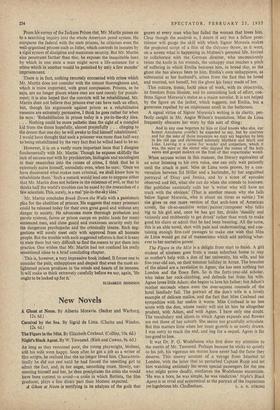New Novels
The Figure in the Mist. By Elizabeth Coxhead. (Collins, 10s. 6d.) Night's Black Agent. By W. Townend. (Rich and Cowan, 9s. 6d.) As long as they remained poor, the young playwright, Molteni, and his wife were happy. Soon after he got a job as a writer of film scripts, he realised that she no longer loved him. Characteris- tically he did not rest until he had forced the unwilling girl to admit the fact, and, in her anger, something more. Slowly, tor- menting himself and her, he then precipitates the crisis she would have been content to avoid—a crisis in which Battista, the film producer, plays a less direct part than Molteni expected.
A Ghost at Noon is terrifying in its analysis of the guilt that gnaws at every man who• has failed the woman that loves him. Clear though the analysis is, I doubt if any but a fellow prac-
titioner will gauge the skill with which Signor Moravia makes the projected script of a film of the Odyssey throw, as it were, on a screen what is happening in M'olteni's personal life. Invited to collaborate with the German director, who unconsciously twists the knife in his wounds, the unhappy man reaches a pitch of suffering in which Emilia bemuses him, in broad day, as the ghost she has always been to him. Emilia's own unhappiness, as substantial as her husband's, arises from the fact that he loved and married, not herself, but the ghost bis fancy made of her.
This mature, ironic, lucid piece of work, with its objectivity, its freedom from illusion, and its astonishing lack of effort, con- firms Signor Moravia's status as a major novelist. It is not helped by the figure on the jacket, which suggests, not Emilia, but a governess repelled by an unpleasant smell in the bathroom.
A signal virtue of Signor Moravia's writing is its clarity, per- fectly caught in Mr. Angus Wilson's translation. Miss de Lima frequently obscures her story by this sort of thing :
And in any case begotten by him or God knows who else, our honest Antoinette couldn't be expected to say, but by courtesy and for the sake of those innocents we may say begotten by him in his old age and christened solemnly Matthew and Mark and Luke. Leaving it a cause for wonder and conjecture, which it was, the saint or the sinner who slapped the names of the holy saints and gospel makers on the fruit of that unparticular womb.
When anyone writes in this manner, the literary equivalent of an actor listening to his own voice, one can only wait patiently until the attack is past. Miss de Lima soon proves, by a con- versation between Ed Miller and a bartender, by her anguished portrayal of Dissy and Jessica, and by a score of episodes observed and felt, what she can do when she attends to business.
Her publisher cautiously calls her 'a writer who will have no truck with the obvious.' (That is another reason why she falls below Signor Moravia, who is about six times as subtle.) Yet she gives us one more version of that arch-bore of American novels, the oh-so-sensitive writer/painter /composer who talks big to his girl and, once he has got her, drinks 'steadily and viciously and stubbornly to get drunk' rather than work to make good his claim or admit that he had been boasting. All the same, this is an able novel, shot with pain and understanding, and con- taining enough first-rate passages to make one wish that Miss de Lima would get rid of mannerisms which add nothing what- ever to her narrative power.
The Figure in the Mist is a delight from start to finish. A girl
student of nineteen goes from a mean suburban home to stay as mother's help with a don of her university, his wife, and his five-year-old son, on their summer holiday in Arran. The beauties of the island are a revelation to Agnes; she has seen nothing but London and the Essex flats. So is the forty-year-old scholar, who takes her rock-climbing, and defends her from his wife. Agnes loves little Adam; she begins to love his father; but Adam's mother succeeds where even the over-sapient counsels of the hotel landlady fail. The portrait of the don's wife is a lovely example of delicate malice, and the fact that Miss Coxhead can sympathise with her makes it worse. Miss Coxhead is no less acute with the don, whose vanity will not let him be altogether prudent, with Adam, and with Agnes. I have only one doubt. The vocabulary and idiom in which Agnes expands and flowers are not those of her suburb. She seems too gracefully articulate. But this matters little when her inner growth is so surely drawn. I was sorry to reach the end, and beg for a sequel. Agnes is far too good to lose.
It was Dr. P. G. Wodehouse who first drew my attention to the merits of Mr. Townend. Perhaps because he sticks so quietly to his job, his vigorous sea stories have never had the fame they deserve. This sinewy account of a voyage from Istanbul to London, with the letter that so perturbed Captain Rapp and set him watching anxiously his seven special passengers for the one who might prove deadly, reinforces the Wodehouse encomium. 'He was a bore, he was simple, he was vindictive.' Night's Black Agent is as vivid and economical as the portrait of the loquacious










































 Previous page
Previous page